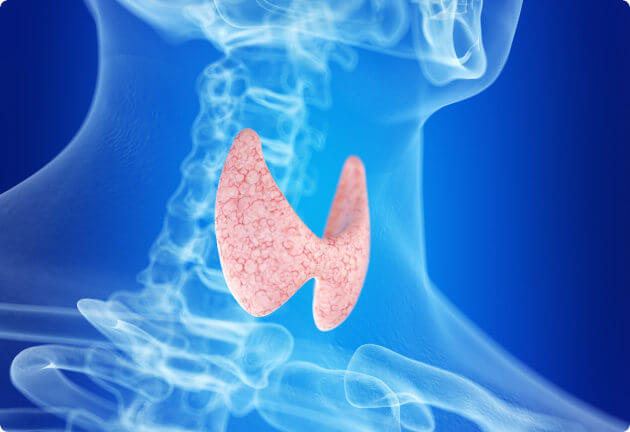Discover everything you need to know about the thyroid and its essential role in your health! Curious about how this butterfly-shaped gland in your neck regulates your metabolism and influences a wide range of functions. In this blog, we delve deeper into the thyroid, discuss the relevance of an underactive thyroid, and the possible consequences for your well-being such as high blood pressure. Learn to recognize the symptoms and uncover the causes behind this condition. Additionally, we provide useful (diet) tips for a healthy thyroid and explain how you can easily test your thyroid function yourself. A healthy thyroid function is vital for your overall health.

What is the thyroid and what is its function?
The thyroid is a butterfly-shaped gland in the neck, located just below the larynx. The thyroid plays an essential role in regulating metabolism. This gland produces two important hormones: thyroxine (T4) and triiodothyronine (T3). These hormones influence nearly all cells and organs and have a wide range of functions. They regulate metabolism, which affects energy production, body temperature, heart rate, digestion, and even brain function. The brain regulates the production of thyroid hormones by producing the hormone TSH. When the brain produces more TSH, the thyroid will also produce more thyroid hormones. This keeps the amount of thyroid hormone in the body perfectly balanced.


To assess thyroid function, blood tests are performed. In such blood tests, TSH and T4 are usually measured. These two values provide specific information about the thyroid and whether enough hormones are being produced. The normal values of the thyroid vary per lab.
What is a slow thyroid?
Maintaining a healthy thyroid function is crucial for optimal health. When the thyroid works too slowly, this is called hypothyroidism in medical terms, and when there is an overactive thyroid, we call it hyperthyroidism. In these conditions, the thyroid gland produces too few thyroid hormones. Since these hormones are essential for many processes in the body, hypothyroidism can cause a wide range of symptoms. Read on to learn about the symptoms you may experience with an underactive thyroid.
Symptoms of a underactive thyroid
Because thyroid hormones influence many aspects of our health, a deficiency in thyroid hormone will cause a range of symptoms.



Common symptoms of hypothyroidism (a underactive thyroid) include:
- Fatigue
- Feeling cold easily
- Hair loss
- Constipation
- Brittle nails
- Weight gain
- Slow heart rate
- Dry, cold, or pale skin
- Irregular menstruation
- The thyroid may enlarge, a condition known as a goiter.
If you experience these symptoms, we recommend making an appointment with your doctor so that the symptoms can be investigated.
Causes of a underactive thyroid
Understanding the causes of hypothyroidism (an underactive thyroid) is important because it affects the treatment and approach to the condition. The most common cause of hypothyroidism is Hashimoto’s thyroiditis. This is an autoimmune disease where the immune system attacks the thyroid gland, resulting in inflammation and damage to the organ. Over time, this can lead to decreased production of thyroid hormones. In addition to Hashimoto’s thyroiditis, there are other possible causes of hypothyroidism. A deficiency in iodine can affect thyroid function because iodine is an essential component of thyroid hormones. Iodine occurs naturally in certain foods, such as seaweed, eggs, and dairy. Moreover, iodine is added to certain products, such as table salt. Certain medications, such as lithium, can also cause hypothyroidism as a side effect. Additionally, thyroid surgery or radiation therapy in the neck area can lead to hypothyroidism. In surgical procedures where a part or the entire thyroid gland is removed, supplementation of thyroid hormone may be necessary to compensate for the deficiency in thyroid hormones. If you have an abnormal thyroid function, consult your doctor about the possible cause.




Consequences of a underactive thyroid
An underactive thyroid disrupts hormone balance, triggering chemical changes in the body. If left untreated, it can lead to weight gain, joint pain, infertility, and heart disease. Other possible complications include fatigue, high cholesterol, and nerve-related issues.
It is, therefore, crucial to recognize and treat hypothyroidism early to avoid the consequences of untreated hypothyroidism, which often lead to serious health issues. Always consult your doctor or healthcare provider for a proper diagnosis and treatment.

How is hypothyroidism diagnosed?
To diagnose hypothyroidism, a combination of blood tests will be performed. These tests measure the levels of thyroid-stimulating hormone (TSH) and thyroid hormones (T3 and T4) in your blood. Depending on the results of the blood tests, the doctor can determine whether your thyroid is functioning properly or if hypothyroidism is present. Want to find out if your thyroid levels are in check? Easily perform the thyroid test at home. If there is an abnormal thyroid value, this will be discussed with you, and advice will be given on the necessary treatment.
Related tests



How to keep your thyroid healthy?
If you have an underactive thyroid, medication is almost always recommended to support thyroid function. It is important that this is done under careful supervision of a doctor.


Do you have a healthy thyroid function and want to keep it that way? Below are some lifestyle tips that support your overall health and thus the health of your thyroid:
- Healthy nutrition
A diet with sufficient nutrients is essential for maintaining good health. Ensure an adequate intake of foods such as fresh vegetables, fruits, whole grains, and sufficient proteins. Limit the consumption of processed foods, sugar, and saturated fats.
- Regular physical activity
Regular physical activity can help boost your metabolism, improve energy levels, and promote a healthy weight.
- Stress management
Chronic stress can have a negative impact on your thyroid function. Learn stress management techniques such as meditation, breathing exercises, yoga, or mindfulness to reduce stress and improve your overall mental health.
- Adequate sleep
Ensure sufficient rest and sleep. A good night’s sleep is essential for your body’s recovery.




Conclusion
An underactive thyroid, also known as hypothyroidism, is a condition where the thyroid gland does not produce enough thyroid hormones, which can lead to various health problems. Recognizing the symptoms, diagnosing the condition, and following the prescribed treatment are essential for health, as untreated hypothyroidism can have serious consequences for your well-being. Maintaining a healthy lifestyle is indispensable for maintaining a healthy thyroid function. Do you want to quickly and easily find out if your thyroid is functioning properly? Then take the thyroid test by Easly.
Sources:
- NHG Richtlijnen – Schildklieraandoeningen
- Richtlijnen Database – Schildklierfunctiestoornissen








